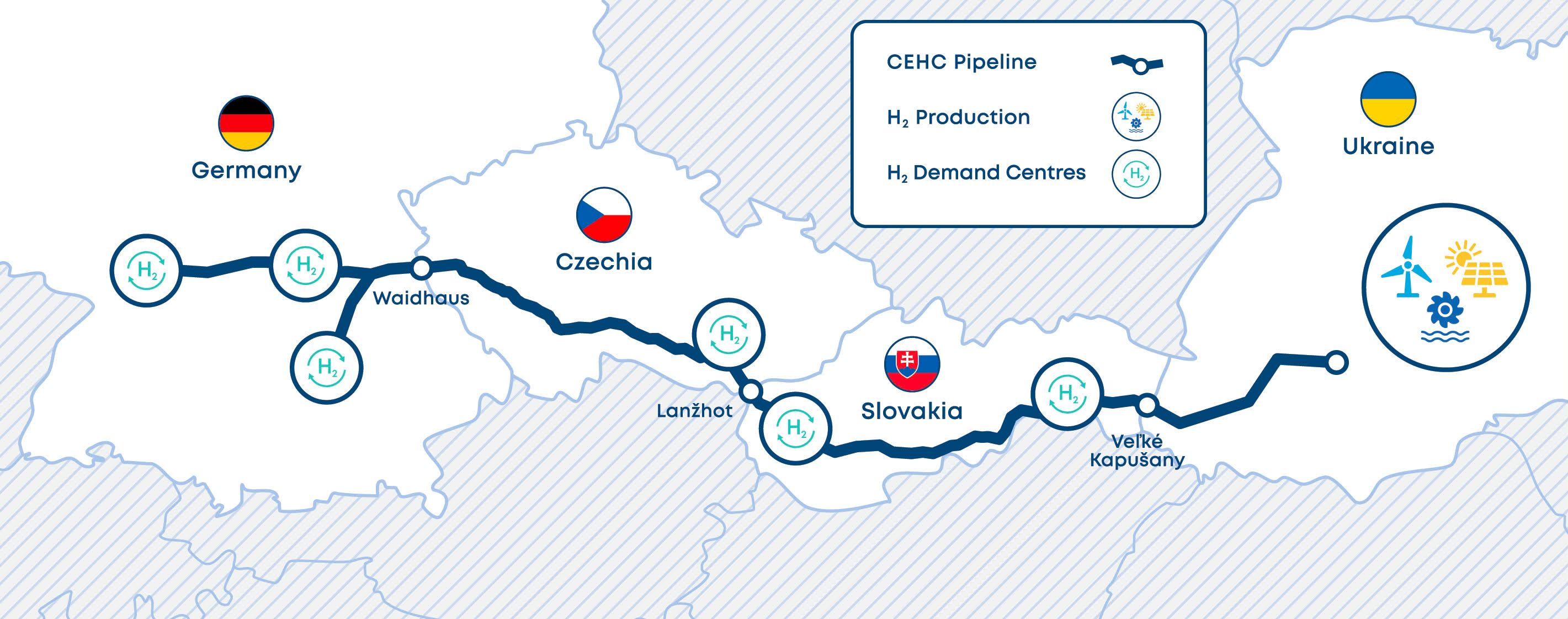The pre-feasibility study indicates that it is technically feasible to transport 120 GWh of hydrogen per day or 1.3 million tonnes per year through Central Europe by 2030 – mainly based on existing infrastructure
In September 2021 four leading Central European gas infrastructure companies joined forces to develop a hydrogen “highway” through Central Europe. The focus of the joint initiative called the Central European Hydrogen Corridor (CEHC) is to transport hydrogen from promising future major hydrogen supply areas in Ukraine that offer excellent conditions for large-scale, green hydrogen production via Slovakia and the Czech Republic to large hydrogen demand areas in Germany and the EU. The hydrogen corridor will also enable transportation of hydrogen between hydrogen production facilities and hydrogen consumers in the Czech Republic and Slovakia. Participating companies include EUSTREAM (the Slovak gas TSO), GTSOU (Gas TSO of Ukraine), NET4GAS (the Czech gas TSO) and OGE (a leading German gas TSO). All participating companies are also actively involved in the European Hydrogen Backbone initiative.
After one year of research, the project promoters have finalized the pre-feasibility study. “The results of the pre-feasibility study are very positive. The study clearly indicates that it is technically feasible to transport 120 GWh of hydrogen per day through Central Europe by 2030. However, there are still many uncertainties remaining, for example what impact the war in Ukraine will have on the project.”, says Andreas Rau, NET4GAS’s Managing Director.
The REPowerEU Plan sets a target of 10 million tonnes of domestic renewable hydrogen production and a new target of 10 million tonnes of renewable hydrogen imports by 2030. The CEHC project could transport up to 1.3 million tonnes of renewable hydrogen imports by 2030, an equivalent of 13 % of the new renewable hydrogen import target.
| Countries: | UA, SK, CZ, DE |
| Capacity: | 120 GWh per day 1.3 million tonnes per year |
| Lenght: | 1225 kilometres* |
| Investment: | 1000 – 1500 million EUR* |
| Transport cost: | 0,10 – 0.15 EUR/kg/1000 km |
| Implementation: | 2030 |
* Investment cost of the part of CEHC from the Ukrainian/Slovak border to large hydrogen demand areas in Southern Germany (without residual value of repurposed assets)
The current plan is to complete the project by 2030, with works starting already in 2024. However, turning this project into reality requires an appropriate legal and regulatory framework and the necessary investment conditions to be in place as the participating companies are fully regulated and unbundled transmission system operators. The project promoters are discussing the project with policy makers and have nominated the CEHC to the EU Ten-Year Network Development Plan. They are also considering applying for the status of Project of European Common Interest (PCI) to be eligible for EU funds. “The Central European Hydrogen Corridor is important as it offers the possibility of delivering substantial amounts of hydrogen to industrial demand centres in Germany and Central Europe already by 2030”, concludes Dr. Jörg Bergmann, OGE’s CEO. He adds, “In combination with the H2ercules project, this will speed up the process of developing a hydrogen market in the heart of Europe”.
The war in Ukraine has not lowered the commitment for the project among the project promoters. “We are still convinced of the importance of the Central European Hydrogen Corridor. The EU has significantly increased the targets for biomethane and hydrogen production in the new REPowerEU Plan to become independent from Russian fossil fuels and has identified Ukraine as one of the key partners in the development of hydrogen energy. This corridor will contribute to the shift to renewable gases and energy security in Europe.” says Pawel Stanczak, Acting General Director of the Gas TSO of Ukraine.
Successful implementation of this venture requires the necessary conditions to be in place, the subject of upcoming discussions between the project promoters, OGE, NET4GAS, EUSTREAM, and the Gas TSO of Ukraine with policymakers.
For more information, please contact the partner companies

